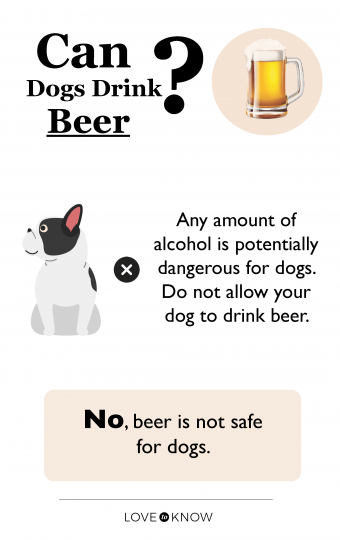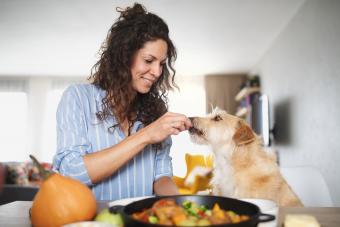
It may be tempting to pour your pooch a sudsy beverage on a hot day, but beer and all alcoholic drinks are inherently unsafe for your dog to drink. Whether lager or IPA, hopped or malty, all beers contain alcohol -- even "non-alcoholic" beers, which have a lower percentage of alcohol in them -- and alcohol presents a serious risk of poisoning to dogs if ingested.

Alcohol Is Unsafe in Any Amount
There is no safe amount of beer for a dog to drink. Typically, dogs are not overly attracted to alcoholic drinks because of the smell of alcohol. However, some dogs enjoy the taste of beer, and will readily accept it if it is offered. Every dog's metabolism is different, and even a very small amount of beer can cause a dog to appear intoxicated.
Well-meaning owners have found their dog drinking beer from an unattended glass, only to observe their pup acting drunk within 30 minutes. Dogs may lose their balance, stumble around the room, act confused, or just look sleepy. This may appear funny or cute to some, but it is a concerning indication your dog may be on their way to developing alcohol poisoning.
It's very difficult to say how much beer can cause a serious reaction in your pet. Very small breeds may only need a few licks from some spilled beer to feel the effects. Larger breeds might have a higher tolerance, but every dog is different. Stay vigilant and make sure your dog never has access to beer to avoid accidental ingestion, and never offer beer for your pet to imbibe.
Play It Safe if Your Dog Drinks Beer
Alcohol poisoning is a serious threat to your dog's health. Dogs may remain asymptomatic, or they may show reactions from mild to severe, even with limited exposure. What appears to be a mild reaction could quickly turn into a severe reaction that can lead to loss of consciousness and death.
If you suspect your dog has consumed any beer, even a small amount, contact your veterinarian immediately. Do this even if your dog shows no ill effects of alcohol poisoning. Acting fast may save your dog's life.

Concerning Symptoms
Typically, dogs will display symptoms of alcohol ingestion within 30 minutes to 1 hour after drinking beer. The type and severity of these symptoms is likely to vary from dog to dog, but generally, you should watch for any behavior that is out of the ordinary. Dogs who are intoxicated might behave in a way that resembles a state of drunkenness in humans. Observe your dog closely if you suspect they have been drinking beer. Watch for the following:
- Confusion and disorientation
- Loss of coordination
- Excessive salivation
- Vomiting
- Odd levels of excitement or lethargy
In severe cases of inebriation, you or your vet may find your dog displaying much more concerning symptoms:
- Loss of bodily control, or ataxia
- Dehydration
- Diarrhea
- Difficulty breathing, which is called dyspnea
- Extreme confusion
- Severe respiratory distress
- A slowed heart rate, or problems with heart rhythm
- Lowered body temperature
- Lowered blood sugar levels
- Dangerously elevated levels of acidity in the body, known as metabolic acidosis
- Seizures, collapse, or loss of consciousness
Any of these symptoms is more than cause for concern. If your dog drank beer, don't take the risk or assume that they'll be OK. Don't allow your dog to ride it out or sleep it off. Take your dog to the veterinarian or emergency health clinic immediately if you suspect they have had any amount of beer.
If you are unsure what to do, you may reach out to Animal Poison Control by calling 888-426-4435. The service is operated by the ASPCA Animal Poison Control Center and may be able to help, though it is a good idea to have your veterinarian's number ready, as well.
Are There Safe Alternatives?
Any product that contains alcohol is off limits for your dog, including all beer. If you want to share a drink with your pup, offer them something safe and hydrating, such as plain water, or one of the prepared commercial drink options intended for canine consumption.

A small amount of bone broth that contains no salt or other additives is likely safe for dogs, as is commercially available -- and properly stored -- goat's milk. Check with your veterinarian before offering these to your pet.
Some dog owners have had success using appropriately prepared broth and goat's milk to dog food as an appetite stimulant. As always, moderation is essential. Your dog should primarily drink plain water, though an occasional sip of something with some flavor is OK, as long as it is approved by your veterinarian.
Don't Risk It with Beer
No amount of beer is safe for dogs. Treat any accidental ingestion as a serious matter and contact your vet immediately. Then, transport your dog to your nearest veterinary office or emergency clinic. Your quick action may save your dog's life.







